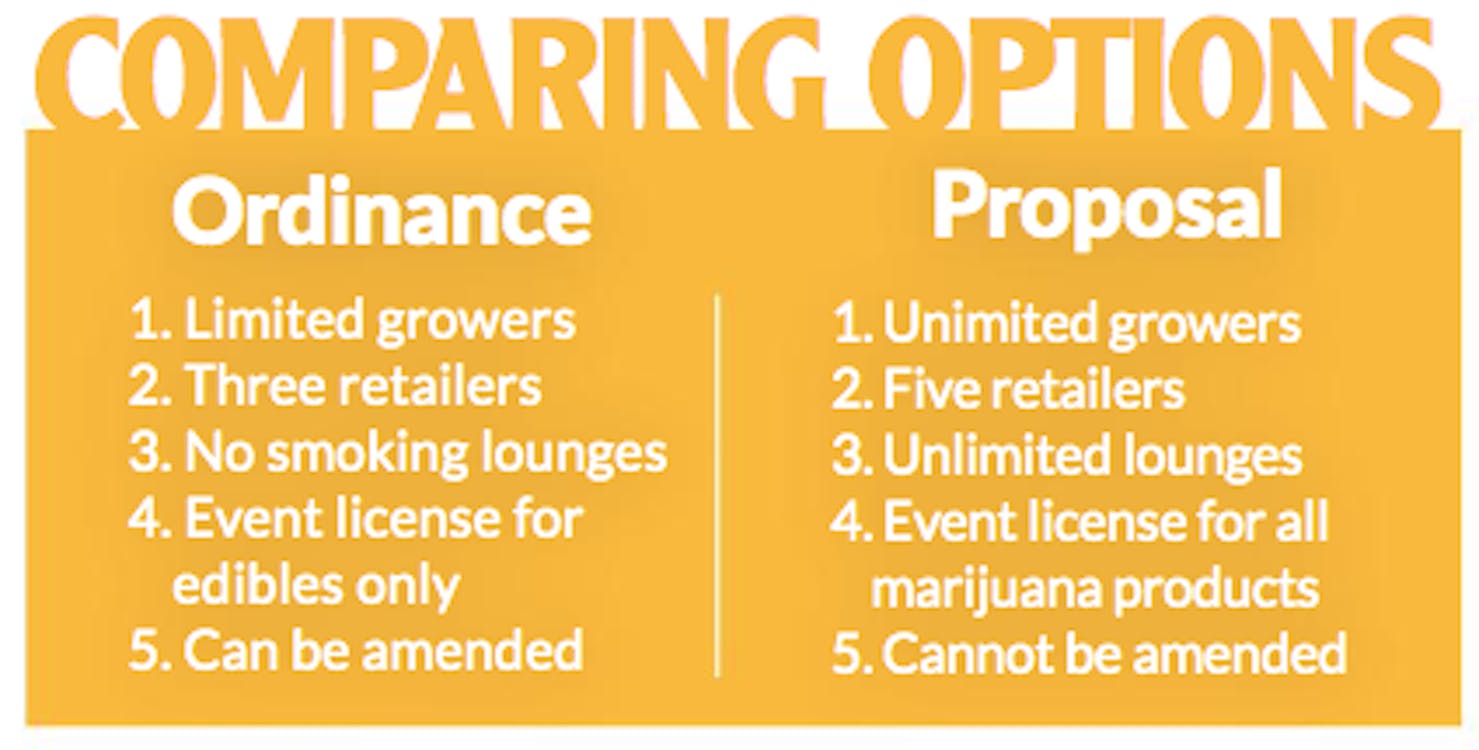Upcoming Mount Pleasant marijuana election features two options

A Central Michigan University student poses for a photo Oct. 29 at an apartment building in Mount Pleasant.
Recreational marijuana businesses will be coming to Mount Pleasant in the near future. Exactly how will depend on the outcome of the 2019 Mount Pleasant City election.
The way recreational marijuana can operate in the city depends on if a ballot proposal passes on Nov. 5 regarding recreational marijuana regulations. If it does, the proposal will replace the recreational marijuana city ordinance that the Mount Pleasant City Commission approved it on Sept. 9. If not, the stricter rules of the city’s ordinance will control the marijuana industry in Mount Pleasant.
After Michigan voters legalized recreational marijuana in 2018, the city went into a scramble to start drafting an ordinance in May earlier this year. The city had recently decided on rules for medical marijuana last year and approved business licenses earlier this year.
Since the city wasn’t prepared to start accepting recreational marijuana businesses, City Manager Nancy Ridley said this led to the city temporarily opting out of the recreational marijuana businesses in June. This was because the State of Michigan indicated that they would want to start issuing recreational licenses in September, and the city’s ordinance wouldn’t have been ready in time.
“When we opted out in June, it was pretty clear at that time that this was a temporary measure,” Ridley said.
The opt-out would only last until the commission adopted an ordinance, receive state regulations and address concerns the city commission had with these businesses, Ridley said. Some of the commission’s main concerns were deciding where the businesses could be, what requirements these businesses should have in order to operate in Mount Pleasant and making the regulations for recreational marijuana establishments were as close as possible for the medical locations. The city then passed an ordinance in September, opting into recreational marijuana after their concerns were addressed.
However, all this didn’t sit well with Brandon McQueen, who is a current Central Michigan University student and city commission candidate (city commission elections will be on the same date of Nov. 5). He also helped petition for the ballot initiative, which was a response to the city’s ordinance.
McQueen said he owned a medical marijuana dispensary in Mount Pleasant in 2010 ad 2011 that led to a civil case in the Michigan Supreme Court. The court ruled that his business was a public nuisance that led to the Isabella County prosecuting attorney sending his dispensary a cease and desist, which McQueen had to follow.
He formed the petition because he felt the city was going to force their personal agenda into the bill.
“(The City) made a mess of opting into medical (marijuana) and they’re trying to do the same thing with recreational,” McQueen said. “Luckily, we have (the proposal) on the ballot and if we get enough votes, we can prevent the city from a disaster of a bill they have.”
The ballot proposal received enough signatures to be put on the Nov. 5 ballot and if it passes, the regulations laid out in the proposal will override how it’s laid out in the city’s ordinance, Ridley said. This is because the ballot proposal passed statewide in 2018 allows citizens to start citizen initiatives regarding local marijuana laws, like the one petitioned by McQueen. Since this is based on state law the process is different then if it was done under the city charter and supersedes anything the city commission passes.
If it doesn’t pass, then these are the rules that will guide the marijuana policy in Mount Pleasant going into 2020 and beyond. Here are the main differences between the ordinance and the ballot proposal, according to both Ridley and McQueen:

Ridley said since recreational marijuana businesses are new to the city, the city commission wants to start small. She said since it’s a commission ordinance, it can be changed anytime by the commission, unlike the ballot proposal. So, if something is working with the ordinance, they have to ability to loosen some of the rules (like allowing more retailers for instance).
One of McQueen’s biggest problems with the city’s ordinance is limiting event marijuana licenses to being edibles only. With the potency of edibles being higher than other marijuana products, he said people who are unfamiliar with marijuana may take in more than they are supposed to and freak out, call the hospital or something else to that effect.
However, Ridley said the commission was concerned about having marijuana smoke outside in a public area and causing a nuisance and second-hand smoke. So, they wanted to start just with edibles and learn from marijuana events and change accordingly.
Another major concern McQueen had was limiting non-retail marijuana businesses to only industrial zones. He said there is only a small amount of industrial properties available for marijuana businesses, both medical and recreational. There are many vacant commercial lots around the city that he said could be filled by these businesses.
However, Ridley said the non-retail marijuana businesses are industrial-type businesses and the limitation to industrial zones is consistent with that. Also, there is vacant industrial land in the city, so she said it shouldn’t limit the number of marijuana businesses. She said if the demand for these kinds of businesses exceeds the amount of industrial land available, the city commission can always change the ordinance to reflect the demand.
When it comes to buffer zones, McQueen said that he feels marijuana businesses are no more dangerous to kids then pharmacies that sell opioids. However, he did say that the 1,000 ft. buffer zone is mandated by the state, meaning anyone looking to apply for marijuana licenses in Mount Pleasant still has to follow that guideline, whether the proposal passes or not.
If the ballot proposal passes, the only parts of the city’s ordinance that will be replaced are the rules laid out in the proposal, Ridley said. For instance, since the proposal doesn’t explain how the city should approve the limited number of retailers in the city. This means the city can decide how they want to approve these businesses, even if the proposal passes.
How the city will approve the limited number of applicant slots will differ from how the city did it with medical marijuana. Earlier this year, the city held a lottery to decide which three medicinal retailers could be approved in Mount Pleasant.
However, Ridley said the city can’t decide this in a lottery this time since the state ballot proposal passed in 2018 doesn’t allow lotteries. Instead, there will be a Marijuana Establishment Selection Committee to help decide what retailers will be approved, based on a set of criteria.
In total, there is a potential of having eight marijuana retailers in town (10 if the ballot proposal passes). This is because, alongside the retailers, she said the ordinance will allow two micro-businesses and the three medical marijuana retailers approved in Mount Pleasant won’t automatically be approved for recreational marijuana licenses. However, the medical retailers will have an advantage with the criteria.
Some of the criteria for recreational marijuana retailers include whether they are an approved medical marijuana retailer in Mount Pleasant, past business ownership experience, residency in Isabella County and current condition of their proposed location.
Ridley said the criteria are sorted into nine categories and have around 100 points allocated to them. The selection committee will review applicants and award points to businesses based on how well they fit the criteria and the ones who come out on top will be the ones approved for the licenses.
Despite three medical marijuana retailers being approved by the city, only one has opened for operation so far. Caleb Carey is the general manager of Consano, a dispensary located downtown at 309 W. Michigan St. and opened on July 8. He said he wanted to open the store in Mount Pleasant because from the Central Michigan area and it seemed natural.
Carey said businesses have picked up since school and he hasn’t been receiving pushback from the community since he got here. He’s even hired some CMU students to work at the dispensary.
He doesn’t have a preference for either the ballot proposal or the city’s ordinance, as long as he has an opportunity to receive a recreational marijuana license from the city. When asked about the possibility of not receiving a recreational license, he said that could be an issue but the merit-based system is better than the lottery system.
“The city is doing the best than can with the merit-based (system),” Carey said. “It is fair for businesses for people who are already licensed in the city.”
Mount Pleasant may first see recreational marijuana businesses by 2020, Ridley said. Whether the ballot proposal passes or not, the city will be accepting applications for retailers in January and February of next year and the committee evaluations in March. She said the process for approving retailer licenses will take longer this time around, due to the committee process.
However, if the number of retailers applying for the licenses is less than the limit, then they will be approved without the need for a committee.
However, Carey said his business opened in July after receiving the license in February this year, which means the licenses might be issued in March next year if the recreational marijuana approval process follows a similar path of the medical process.






